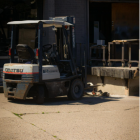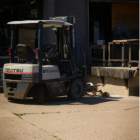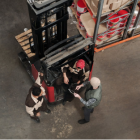Finding reliable and affordable used forklifts for sale near you can be a daunting task.
The market is vast, with countless options to choose from.
This guide aims to simplify the process. It provides practical tips on how to find the best deals on used forklifts.
We’ll delve into how to evaluate a forklift’s condition, understand market prices, and avoid common pitfalls.
Whether you’re a warehouse manager, a small business owner, or a logistics professional, this guide is for you.
Let’s embark on this journey to find the perfect used forklift for your needs.
Why Consider Used Forklifts?
Used forklifts offer several advantages over new ones.
Firstly, they are significantly cheaper. This makes them a great option for businesses on a tight budget.
Secondly, used forklifts are readily available. You don’t have to wait for the manufacturer to produce and deliver a new machine.
Lastly, a well-maintained used forklift can perform just as well as a new one. It’s all about finding a reliable machine that has been properly cared for.
Where to Find Used Forklifts for Sale Near You
Finding used forklifts for sale near you is easier than you might think.
There are several online marketplaces that specialize in used industrial equipment. Websites like eBay, Machinery Trader, and Forklift International are good places to start.
Local dealers are another great source. They often have a range of used forklifts available and can provide valuable advice.
Don’t forget about auctions and liquidation sales. These events can be a goldmine for finding high-quality used forklifts at a fraction of the cost.
Here are some tips to help you in your search:
- Use specific search terms like “used forklifts for sale near me” or “used forklifts for sale Sydney”.
- Check out the seller’s reputation. Look for reviews or testimonials from previous customers.
- Don’t be afraid to negotiate. You might be able to get a better deal than the listed price.
- Always inspect the forklift in person before making a purchase.
Evaluating the Condition of a Used Forklift
When buying a used forklift, it’s crucial to evaluate its condition.
Start by checking the hours of operation. This is the forklift’s “mileage” and can give you an idea of how much it’s been used.
Next, look at the maintenance records. A well-maintained forklift is likely to be more reliable and have a longer lifespan.
A physical inspection is also essential. Look for signs of wear and tear, such as rust, leaks, or damaged parts.
Here are some specific things to check during your inspection:
- Tire condition: Worn or damaged tires can affect the forklift’s stability and safety.
- Lift capacity: Make sure the forklift can handle the weight you plan to lift.
- Operational controls: Test the controls to ensure they are working properly.
- Overall cleanliness: A clean forklift is often a well-maintained forklift.
Remember, it’s always a good idea to have a trained technician or mechanic evaluate the forklift as well. They can spot potential issues that you might miss.
Types of Forklifts and Their Uses
There are several types of forklifts available, each suited to different tasks.
Counterbalance forklifts, for example, are the most common type. They are versatile and can be used in a variety of settings, from warehouses to construction sites.
Reach trucks, on the other hand, are designed for narrow aisles in warehouses. They have a unique design that allows them to reach high shelves.
Finally, there are rough terrain forklifts. These are built for outdoor use and can handle uneven surfaces.
Understanding the different types of forklifts can help you choose the one that best suits your needs.
The Importance of Test-Driving a Forklift
Just like buying a car, test-driving a forklift is crucial. It gives you a feel for how the machine operates and handles.
During the test drive, pay attention to the forklift’s responsiveness. Check the brakes, steering, and lifting mechanisms.
A test drive can reveal potential issues that may not be apparent during a visual inspection. It’s an essential step in the buying process.
Dealer vs. Private Seller: Pros and Cons
When buying a used forklift, you have two main options: dealers and private sellers. Both have their advantages and disadvantages.
Dealers often offer warranties and have a reputation to uphold. They may also provide maintenance services and support. However, their prices can be higher.
Private sellers may offer lower prices. But they might not provide any after-sale support or warranties. The risk of encountering issues with the forklift can be higher.
In the end, the choice depends on your budget, risk tolerance, and support needs.
Understanding Warranties and Guarantees
Warranties and guarantees can provide peace of mind when buying a used forklift. They assure you that the seller will cover certain costs if problems arise.
However, not all warranties are the same. Some cover only specific parts or issues. Others may require you to use certain service providers.
Always read the warranty or guarantee terms carefully. Make sure you understand what is covered and what isn’t before making a purchase.
Negotiating the Best Price
Negotiating the price of a used forklift can be a daunting task. However, it’s a crucial step in getting a good deal.
Start by researching the market value of the forklift model you’re interested in. This will give you a baseline for negotiations.
Don’t be afraid to ask for a lower price. Sellers often expect some haggling. Just make sure your offer is reasonable and backed by your research.
Remember, the goal is to reach a price that both you and the seller are comfortable with.
Total Cost of Ownership: Maintenance and Repairs
When buying a used forklift, it’s important to consider the total cost of ownership. This includes maintenance and repair costs.
Regular maintenance is crucial to keep a forklift in good working condition. This can include oil changes, tire replacements, and other routine checks.
Repairs can be costly, especially for older models. It’s wise to set aside a budget for unexpected repairs.
Remember, a cheap forklift can end up being expensive if it requires frequent and costly repairs. Always factor in these costs when considering a purchase.
The Role of Forklift Certification and Training
Forklift certification and training play a vital role in safe operations. It’s not just about driving the machine.
Training equips operators with knowledge on safety protocols. It also teaches them how to handle unexpected situations.
Ensure your operators are certified. This not only promotes safety but also reduces the risk of costly accidents.
Conclusion: Making an Informed Purchase
Buying a used forklift is a significant investment. It requires careful consideration and thorough research.
By following the tips in this guide, you can find a reliable and affordable forklift. Make an informed purchase that suits your operational needs and budget.




